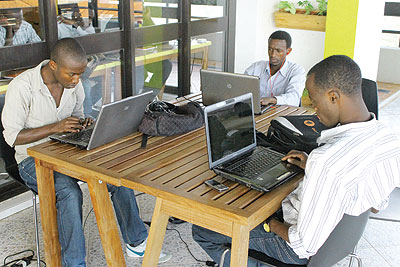The economist of February 25, 2012 dedicated a page on Rwanda. Their story, “Business in Rwanda – Africa’s Singapore?”, with a sub-title, “A country with a bloody history seeks prosperity by becoming business-friendly”, attracted my interest.


The economist of February 25, 2012 dedicated a page on Rwanda. Their story, "Business in Rwanda – Africa’s Singapore?”, with a sub-title, "A country with a bloody history seeks prosperity by becoming business-friendly”, attracted my interest.
I was interested in the piece, not merely that I fancy The Economist’s style and quality of writing, but because I was eager to know the sort of judgment an outsider could put forward about the country I cherish as mucn as my own life.I was impressed by the article…it was great piece; only stained with a couple of deliberate and narcissistic miscounts:Rwanda, Africa’s Singapore?After reading the article, I was not impressed that the writer was advocating that Rwanda follows in the footsteps of Singapore as it tries to advance its society. First and foremost, Rwanda isn’t and will never, by any means, be the Singapore of Africa. Singapore is and will forever be the Singapore of Asia. Rwanda is and will only be the Rwanda of Africa. Singapore remains only a model that Rwanda, like any other ambitious economy, assiduously wishes to emulate in some specific, but limited scope.The point here is clear; Rwanda will not achieve an archetypal socio-economic transformation by "copying and pasting” what was actualised in a whole different environment. We will attain the development we need by primarily understanding, springing up and optimising our obvious and immense potential, as well as by drawing bottom-line lessons from both the Asian success stories and the great ideas alongside the downfalls of the West today.‘The elections are a sham’A bit of politics here... I am not a politician, at least as of now. But, in all honesty, I try to be a dutiful and law-abiding citizen to the best of my ability. The election exercise among other civic duties in Rwanda, since 2003, has all the way through been nothing but peaceable, conducive, free and fair. The "sham concept” is an imported notion. It is nowhere to be found in our election records as The Economic wanted its readers to believe.In fact, Rwanda, as a nation, has never witnessed as well-ordered, as peaceful, and as inclusive elections as it has over the last decade.Lack of critical thinkingThe author of the article goes on to quote the Legatum Institute: "Most domestically educated Rwandans have never learned how to think independently and critically …” This UK-based idealistic institute claims to be an independent non-partisan public policy organisation that aims at promoting free and prosperous societies. Yet, they arrogantly dare to publish subjective and unsubstantiated statements that throw a significant segment of a decent nation into the pothole of ‘ignorance’. Who are the "domestically educated” Rwandans? How many are they as compared to the rest of the Rwandan society? And how do they happen to be devoid of independent and critical thinking?The truth is, Rwandans, practice and genuinely enjoy critical thinking, but not quite as much as we display it. The problem with us isn’t that we lack critical thinking, but simply that we tend to be more self-conscious when it comes to public matters. Plus, if critical thinking, to some, implies ‘hooliganism’, to Rwandans, it goes hand-in-hand with the sense of self-worth. Jumping to the conclusion that ‘domestically educated’ Rwandans are lost for critical thinking is a crass misinterpretation of facts.Overall, it would be more expedient, especially when it comes to ‘outsiders’ account, to avoid any attempts to rewrite the history of a nation as decent as Rwanda, to exclude condescending resonance and to always reckon the worth and dignity of the other side of their world in any form of their portraits. Self-absorbed and non-representative sort of write-up can’t fix a thing; neither can they push us an inch forward in our highly-spirited strive for self-reliance and full ownership of our destiny.The writer is the Private Sector Federation (PSF) head of training and development




